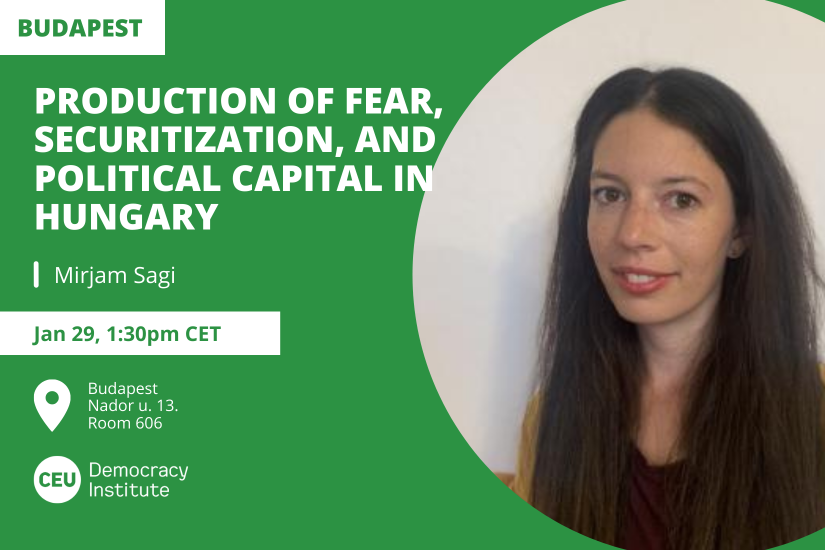
The Inequalities and Democracy Workgroup of the CEU Democracy Institute cordially invites you to its public seminar.
If you would like to attend, please register here.
Please keep in mind that external guests will not be able to enter the building without prior registration.
The seminar starts with a 25-minute presentation of the research followed by the comments of the discussant. Then the floor will be open for participants to ask questions and discuss the research. To be able to actively take part in the discussion, please read the draft paper beforehand which is available upon request from the author.
Abstract:
This research investigates the relationship between political securitization and electoral success, with a specific focus on Hungary's fearmongering campaigns. It posits that political securitization, as a tool, encompasses two distinct stages: first, the (re)production of uncertainty and fear, and second, the presentation of securitization strategies as solutions, yielding political gains. Drawing from Hungary's political landscape over the past decade, this study demonstrates that fear, to be harnessed for political advantage and garner public support, must first be strategically (re)produced. The analysis is structured into two sub-chapters: the first explores the political construction of fear, while the second delves into the diverse forms of protection offered as responses to these fears and threats. These two processes together form what is termed as "securitization."
The Hungarian context presents a unique dimension to Anti-Gender (AG) campaigns in specific, with the concept of "gender" virtually absent from everyday discourse before the 2010s. Anti gender campaigns in particular are integrated into a larger political strategy that employs various scapegoats and techniques. Fearmongering extends beyond gender-related issues, encompassing migrants, people of color, and "cosmopolitans" who allegedly promote liberal/Western values. Themes are perpetuated and reinforced through political tools like referendums, national consultations, and information campaigns, all designed to channel fear towards specific issues or groups portrayed as common enemies outside the national norm. This research identifies two critical patterns in national fearmongering campaigns: the repetition of targeted social groups and the recurrence of campaign tools. Political capital is accrued by the government through responses to these perceived threats, encompassing (1) rhetorical, (2) legal, and (3) physical protection measures. These interventions are portrayed as acts of state protection, with examples including changes to constitutional definitions of family and border enforcement. In this environment, specific fears are carefully selected – or rather fear is channelled towards specific issues, allowing for the presentation of spectacular solutions through protection campaigns. Consequently, other pressing fears, such as those related to the crisis of education, (health)care and financial security, are often overshadowed and overlooked.
Speaker:
Mirjam Sagi is a postdoctoral researcher at the Central European University working on the CCINDLE project. She has a mixed social science background in Gender Studies (CEU), Human Geography (UCL) and Sociology (University of Leeds). Mirjam has recently received her PhD dissertation to the Social and Economic Geography Department of Eötvös Loránd University focusing on the ways in which fear affects public space and democracy. She is a member of the HerStory collective which is an informal feminist collective collecting women’s narratives of their life with a special interest in green feminism.
Discussant:
Balint Mikola is a Post-doctoral Research Fellow working on the project "Neo-authoritarianisms in Europe and the Liberal Democratic Response" (AUTHLIB), covering several administrative and research roles. His current research mostly focuses on what policies illiberal regimes adopt in power, and what variations might be detected across different policy areas. Beyond that, he also contributes to theoretical work on the definitions of illiberalism, as well as creating a multi-dimensional map of illiberalism that allows for the identification of country-specific configurations.